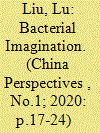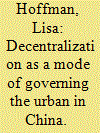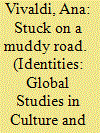|
|
|
Sort Order |
|
|
|
Items / Page
|
|
|
|
|
|
|
| Srl | Item |
| 1 |
ID:
172995


|
|
|
|
|
| Summary/Abstract |
This paper studies the critical role of the microscope in subject formation of early 1950s People’s Republic of China. The campaign against alleged germ warfare (xijun zhan 細菌戰) in 1952 politicised the action of seeing the enemy through the discourse of science. Widely used for science education and mass mobilisation for the campaign, the microscope was at once visual technology and an apparatus of power, magnifying hidden and invisible enemies that threatened the new regime. This paper argues that “seeing the enemy” was the hygienic practice of weisheng (衛生), which took on a new meaning of abjection in the early 1950s. By looking into news reports, visual materials, and science writing from this period, this paper proposes a transdisciplinary methodology for studying PRC history that brings together psychoanalysis, visual culture studies, and the history of science and technology.
|
|
|
|
|
|
|
|
|
|
|
|
|
|
|
|
| 2 |
ID:
128527


|
|
|
|
|
| Publication |
2013.
|
| Summary/Abstract |
This paper considers what a Foucauldian-informed analysis of decentralization and urban transformation offers to current debates. It analyzes decentralization as a new regime of governing, in contrast to many studies that treat it as a policy process, objective or outcome aimed at alleviating some problem of centralized authority. Rather than understanding decentralization as less state governance, this paper asks how practices such as local autonomy are in fact technologies of governing the urban. Decentralization is analyzed then not simply as an absence of some central state power, either in the political or fiscal realm, but rather, as new mechanisms of governing the urban, which are linked with the regulation and constitution of subjects. The paper focuses on an aspect of decentralization that typically is under-examined: the decentralization of welfare provisioning in urban China. Under high socialism of the Maoist era, social services for urban residents were distributed by the state, through the work unit (danwei) as part of the planned economy. In recent years, however, major reforms have been put into place to diversify the ways in which social services are delivered, under a general rubric of decentralizing the distribution away from the state. Based on anthropological research in Dalian, a major port city in northeast China, this paper examines a new social practice and subject form that has emerged with new ways of caring for those in need in the city: volunteerism. By focusing on this resulting social form, the paper argues that we may better understand how decentralization is not a singular process with multiple outcomes, but rather, a complex assemblage of elements that includes technical questions about how to govern as well as normative practices of subject formation. An analytical disaggregation of these elements also allows us to avoid the assumption that decentralization necessarily contains certain characteristics, or that it will lead to particular kinds of political and social forms.
|
|
|
|
|
|
|
|
|
|
|
|
|
|
|
|
| 3 |
ID:
113899


|
|
|
|
|
| Publication |
2011.
|
| Summary/Abstract |
This article explores how the Toba, an indigenous group in the North of Argentina, shape places and an urban subjectivity in the frictions of their mobility between villages, the urban barrio (neighborhood), and the periurban bush. I argue that the experience of Toba moving to the city is better understood as frictions between the Toba desire to progress in the city, the organization of difference in space, and their multiple movements "back" to the villages. In addition, I analyze their contemporary hunting trips, which take urban Toba to the nearby bush, as a mobility that shapes a form of indigeneity engaged with access to both the city center and the bush. This practice confronts them with ranch owners and police but reconnects the barrio and the bush by traversing them. If frictions emerge between forces that trigger movement and forces that slow that movement down, in the frictions of mobility the Toba have at once shaped their position in the city and overflowed its limits.
|
|
|
|
|
|
|
|
|
|
|
|
|
|
|
|
|
|
|
|
|